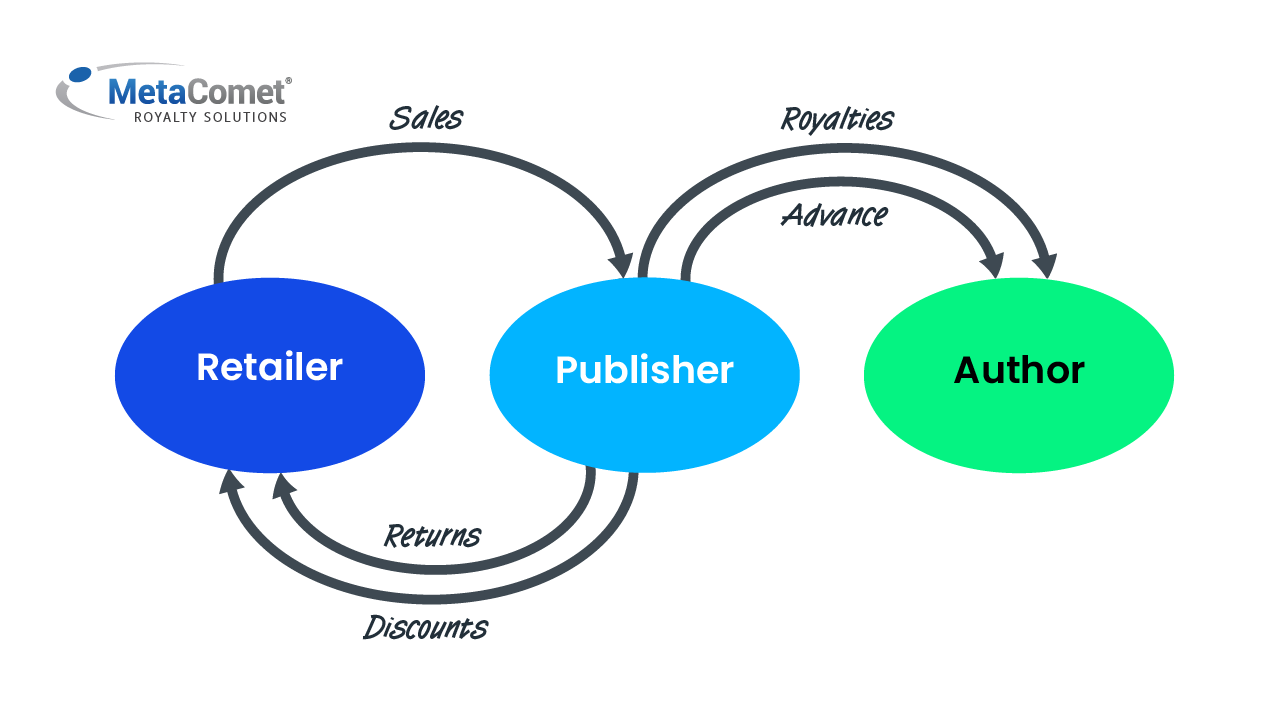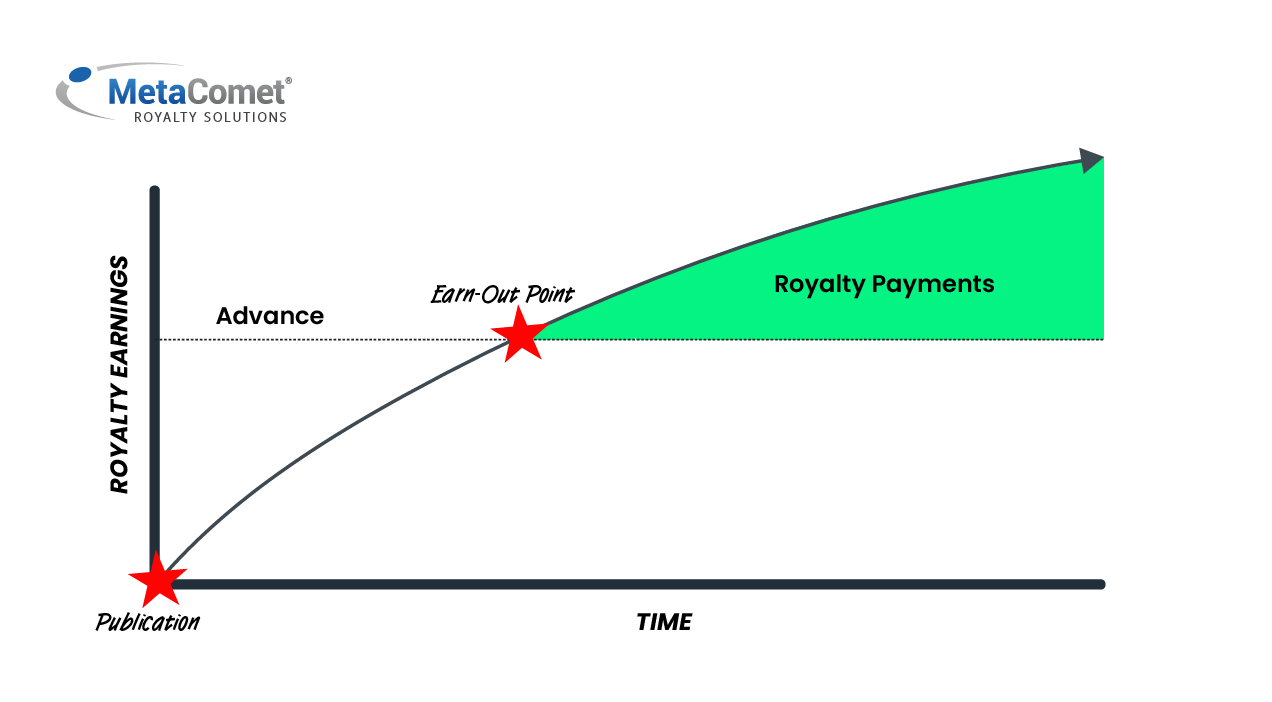Tracking Book Publishing Royalties: 15 Frequently Asked Questions
Many MetaComet® customers are running established publishing houses with years or decades of experience managing book publishing royalties. But others are just getting started. If you are new to the business, you may have some questions. Fortunately, the royalty experts at MetaComet® Systems have answers. This comprehensive FAQ page covers all aspects of book publishing royalty management, which is exactly what Royalty Tracker® automates.

1. What are royalties in book publishing?
Royalties are a percentage of sales paid to an author by their book publisher. The royalty rate is agreed upon by the two parties when the author licenses their work to the publisher.
Royalties may be calculated based on the retail price of the book (known as “retail royalties” or “list royalties”) or on the publisher’s net revenue from book sales. Retail royalties are relatively simple to estimate and calculate, while net royalties can be much more complicated, based on varying levels of discounts the publisher offers to different retailers over the life of the publication.
The alternative to a royalty based model is “work for hire”. Sometimes publishers will hire writers to write content which the publisher then owns outright. The royalty based approach enables publishers and authors to share both the risks and rewards. If a book does well, the author may do better than a work for hire arrangement. If the book performs poorly, the publisher may not recoup their investment in the cost of writing the book.
2. What is a publishing advance?
Some publishers pay an advance to an author before a book is published. The advance is usually “against royalties,” meaning that it is subtracted from future royalty payments. The advance may be paid in increments, triggered by certain events, such as the signing of the contract and the delivery of the book manuscript.
Advances help incentivize authors to take the risk of writing a book, which may or may not sell well.
3. What is a royalty earn-out?
The royalty earn-out is the point at which the royalties earned are equal to or greater than the advance that has been previously paid. At this point, the publisher will begin sending royalty payments to the author.

4. What is a royalty reserve?
Book retailers generally require publishers to accept returns of unsold books, for full refunds. Accordingly, publishers may reserve some royalty payments in anticipation of the possibility of future returns and refunds. This helps protect publishers against the chance of receiving returns on sales for which royalties have already been paid.
5. What are typical book royalty rates?
Royalty rates vary tremendously. In some publishing models, often called “hybrid” publishing, publishers and authors share the cost of producing the book, and in turn receive a higher royalty. This could be 50% of net sales, or even 90%.
In more traditional publishing models, the publisher takes most of the risk and therefore pays out lower rates. These rates are typically a percentage of net sales. For example, it might be common for royalties on ebooks to be 25%, or even 50%, whereas sales on paperback books may be more like 10%.
In “traditional” publishing, sales of hardcover books often pay a percentage of the list price rather than the net sales.
It is common for royalty rates to vary for highly discounted sales.
Often when a publisher signs a contract with an author, the publisher gets all of the rights to the content. In that case, the publisher may license out the content to others, such as foreign publishers, or film or TV rights. These are usually referred to as subsidiary rights. Royalties on these revenue streams are often 50%.
6. Do book royalty rates ever change?
In some instances, authors and publishers negotiate a royalty rate increase to be triggered when a book reaches a certain level of sales volume. This can have different names such as a “royalty escalator,” “tiers,” or “sliding scales.”
Sometimes publishers may not see value in continuing to publish low volume books, and so they may work with the author to renegotiate the royalty rate to make it a win-win situation for both parties.
7. How are book publishing royalties calculated?
Royalty payments are calculated based on a complex set of conditions, as described above, and the rules vary from publisher to publisher, depending on how they structure their agreements with their authors. The factors in royalty payment calculations may include:
- Sales: How many copies of the book have been sold during the royalty period?
- Price: What is the list price of the book?
- Type of royalties: Does the contract specify retail royalties or net royalties?
- Royalty rate: What is the current royalty rate? Has an escalator been triggered?
- Discounts: What discounts have retailers received?
- Returns: What is the volume of book returns within the royalty period?
- Reserve: Is the publisher holding back a reserve?
- Advance: Have the royalty earnings met the earn-out point yet?
Master How Book Royalties Work Automatically!
MetaComet® Handles Every Variable Listed.
Sales volumes, price variations, escalators, returns, reserves – why calculate these factors manually when our system processes everything automatically? Eliminate calculation errors instantly. Get your free consultation now.
8. What is a royalty statement?
A publisher will issue regular royalty statements to authors, showing the author’s royalty earnings within a certain period, and ideally, how those earnings were calculated. The best royalty statements will include all the details the author needs to check their publisher’s calculations and confirm their accuracy.
A few publishers still deliver printed royalty statements, but these days it is much more common for royalty statements to be delivered digitally, through email or a royalty portal.
For more details, see our Royalty Statements Guide.
9. What is a royalty period?
The royalty period is the increment of time in which a publisher will calculate royalty earnings and distribute royalty statements and payments to authors. The royalty period may be as brief as a month or as long as a year, depending on the publisher/author agreement. Quarterly royalty periods are common.
10. How much of a book publisher’s revenue goes to royalties?
The percentage of a publisher’s revenue that goes towards royalties usually falls between 22-25% depending on the royalty rates they offer their contributors and the discounts they give to their retailers.
11. Do first-time authors get royalties?
If their book sales volume reaches the earn-out point, first-time authors will receive royalty payments from the publication of their books.
12. Do you pay taxes on book royalties?
Book publishing royalties are taxed like other income.
13. Are book royalties forever?
Usually book royalties are contracted to be paid for the life of the work’s copyright. Currently U.S. copyright law preserves the copyright for the duration of the author’s life plus an additional 70 years. So, the author’s heirs may receive royalties for up to 70 years after their death if the book is continuing to sell.
14. Is managing royalties a challenge?
Book publishing royalty calculations can quickly become complex and time-consuming, with plenty of room for human error. Spreadsheet software can help, but it becomes less effective as a publishing company begins to grow and its accounting needs become more complicated, and the publishing business itself becomes more byzantine. Many publishers find themselves overwhelmed by the amount of time needed to calculate royalties, and errors often lead to late, inaccurate, or missed payments to authors.
15. Should I automate my company’s royalties?
MetaComet developed Royalty Tracker® and our other royalty automation tools to make royalty management easy and eliminate the stress surrounding complicated royalty calculations. Very small publishing companies may be able to successfully manage royalties using spreadsheets, but most publishers will benefit from adopting royalty automation, which can save up to 95% of the time required for accurate royalty management. MetaComet software also integrates seamlessly with other leading publishing industry solutions for a frictionless workflow.
Any more questions?
MetaComet has over 25 years of experience in providing royalty management solutions. Hundreds of publishers recognize our software as the gold standard for royalty management. If you are a publisher interested in learning whether royalty automation is right for your business, please contact us for a free consultation.
If you found this article useful, you may also be interested in our Rights & Royalties Definitions – Glossary of Terms.

David Marlin is the President and Co-Founder of MetaComet® Systems, a prominent provider of royalty automation tools. Since founding the company in 2000, David has spearheaded the development of a suite of best-in-class systems that effectively facilitate royalty processes for nearly 200 publishers. David has also served as the chair for The Book Industry Study Group’s Rights Committee and Digital Sales Committee.
Before establishing MetaComet Systems, David served as a technology consultant for renowned publishers, collaborating with notable companies such as Random House, Penguin, HarperCollins, Holtzbrinck, Macmillan, Scholastic, Time Warner, and many others. David holds both an MBA and a BA from Columbia University in New York.
Contact Us
"*" indicates required fields

